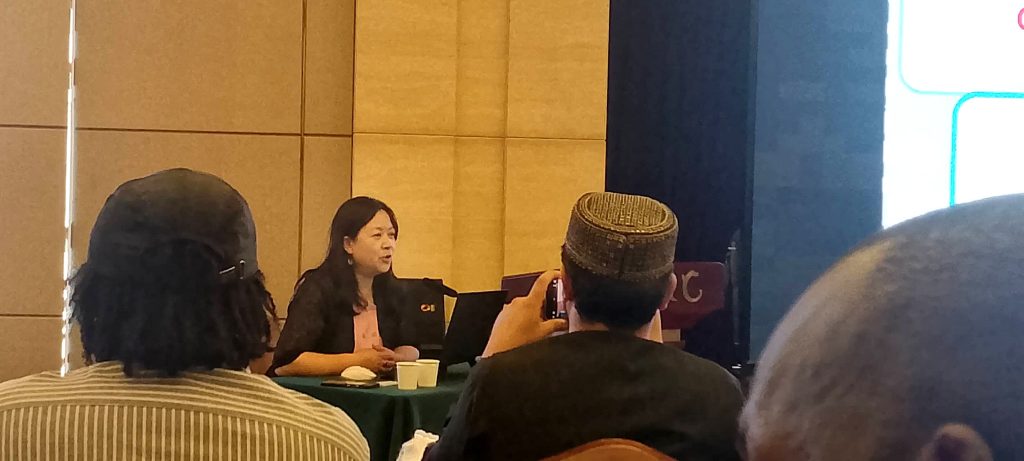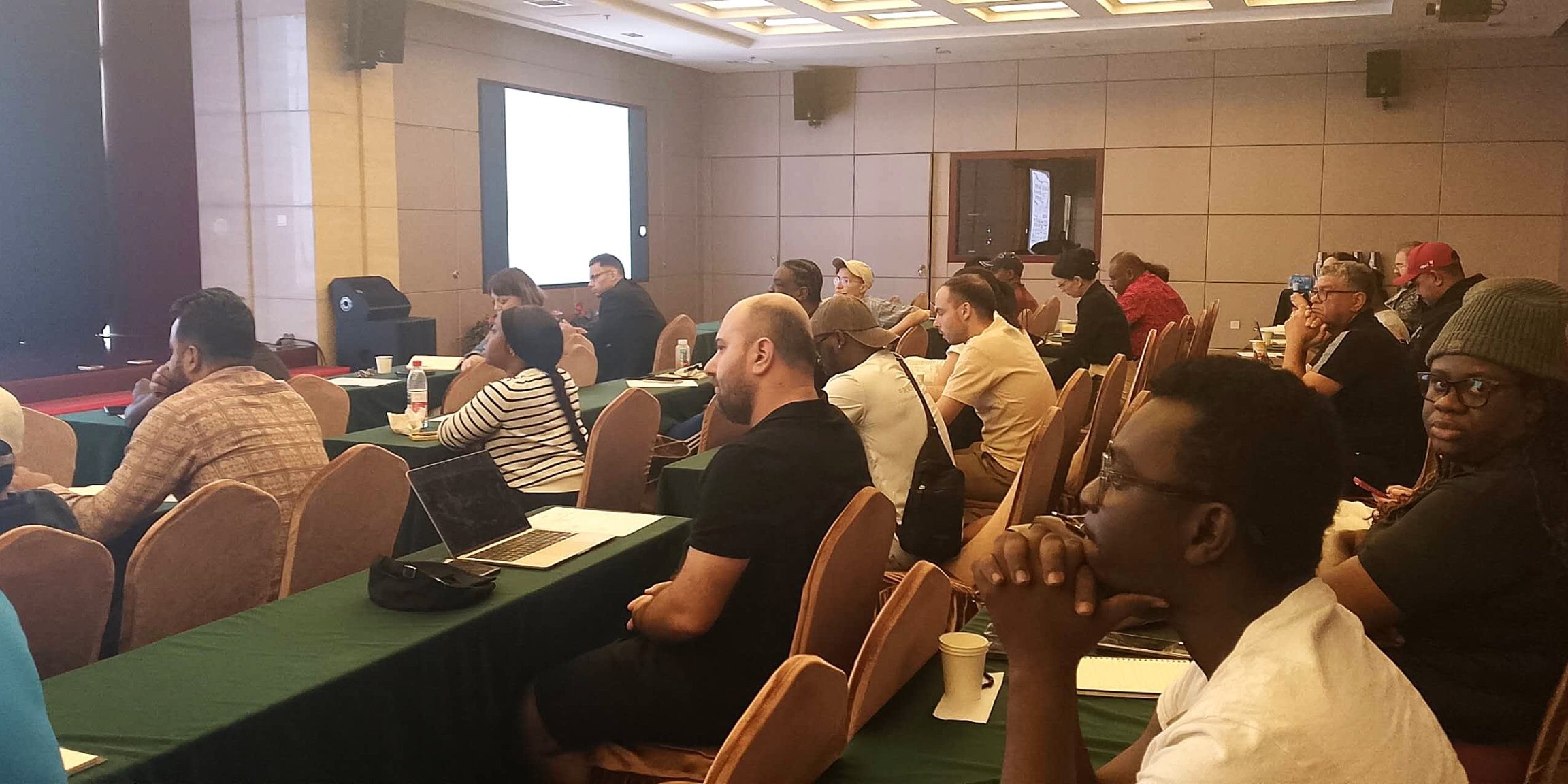THE Chinese media play the constructive role of promoting social and economic development as designed by the Chinese government, and have contributed significantly to China’s modern advancement, said Professor Zhang Yanqiu.
Prof Zhang is the Director, Deputy Dean of the Africa Communication Research Center of the Communication University of China.
She was lecturing international journalists undertaking a media exchange program in China on the subject of “Constructive Journalism for Global Development Communication” in Beijing on Thursday 5 June.
“In China, the government designed the media to help it govern, and therefore the Chinese media plays a crucial role in in promoting social and economic development, and improving the digital economy.”
Prof Zhang said the western media thinks the Chinese media is all government-controlled and so lacks freedom and does propaganda, but the United States also used the media -not weapon – to end the Cold War and continues to use the media as its weapon of soft power.
“So, the biggest propaganda country is the US because it uses the media – not weapon – to end the Cold War. You think so? The cold war was a media war. The US also used the social media to launch the Jasmine Revolution and the other colored revolution without using any weapons.
What is propaganda and who does propaganda?
“So, let us rethink what propaganda is? Okay, but it seems that we don’t want positive reporting because it is more like propaganda. The truth is negative stories are also propaganda. So, who is doing propaganda? Actually you, me, all of us, and people from the US and everywhere are doing either positive or negative propaganda.
“What is propaganda? Don’t you think negative reporting is also propaganda? Yes, it is. Why is it propaganda? Because it leads people to think in one direction. Either it is a positive or a negative story, but leads people to think in one direction, that is propaganda.”

Prof Zhang spoke of some of her African students telling her that in their countries, “if you report about China in a positive or good way, it is not a good story. So, you have to do the bad news or negative story about China to attract audience – readers, listeners or viewers.”
She highlighted that the US uses its media as its weapon of soft power, promoting the liberal values of democracy, freedom of expression, human rights and election, and anything that is not in line with these values is reported on from a negative angle, and China has been a target of negative reporting.
Journalism in the western world is business – negative stories raise more income
“So, in this case, journalism is a business – you use the negative story to attract attention because when you attract attention, you raise the ratings and raise more income revenue.”
“If there is positive reporting, your audience don’t like it. Positive reporting is seen as propaganda and your audience hate it. But the important question is do you always leave the negative story to make good news – dramatic news about conflicts, corruption and all negative stuff just to raise your ratings and income?”
Prof Zhang said against the backdrop of these contrasting ideologies, it is crucial that the role of the media be rethought.
Why China bans international media and social media platforms
“In China, we do not have twitter, Facebook, Instagram, google or the international media. You might ask why China wants to improve its international image if it stops communicating with others through international media and international media platforms?
“It’s true we miss that opportunity, but we earn more. I ask you what is the territory of a country? Is it only the land? What about the sky, what about your media sphere or media landscape? Don’t you think media landscape is also your territory? What about digital cyberspace? When we talk about cyberspace, we should also talk about digital sovereignty, especially in terms of security.
“National security is based on cyberspace? This is serious, and you cannot just open the door for example to the BBC, CNN, DW, Facebook and X to come into your country and report negatively about you without any defense.”
“That’s why you do not need to worry too much about disinformation, fake news, misinformation issues, and even pornography here. You can worry about your children in other places, but in China, the government takes care of that and parents don’t worry at all because there is no pornography website or online.”
China has its own social media platform WeChat where all kinds of services are provided
Prof Zhang said China has its own social media platform called “WeChat”, on which people receive all kinds of government service.
“We receive all kinds of e-banking, e-commerce. We do all kinds of daily communication, but all under the law of the Chinese government or constitution and it is a big business now. We receive a very good service because Chinese telecommunication companies are free because they are all government-owned.”
She said in China, all mobile sim cards are registered to real names, ensuring a trust system, and efficient e-banking.
“A trust system is built, and government provides very affordable, very reasonable price for telecommunication service and the government allows social media platform like WeChat to operate like traditional media.
“What does this mean? They have to watch their content in total contrast to twitter, Facebook and Viber which have no content-control mechanisms?
“So, what do you call this? You can call it censorship or control, but I will use another term: That is governance. The Chinese government uses both traditional and digital play platforms to do governance, to run the country. So, the Chinese media is not a business, but a governance platform.
“That’s why we have to rethink whether we really, really understand what is going on in China – about its media: both traditional media and digital media.”
Developing countries’ dependence & importance of rethinking whether free world order is beneficial
Prof Zhang also highlighted the dependence theory that propagates that developing countries can only be developed by relying on the developed countries.
“But what happened during the so many years that developing countries have relied on the developed countries? African countries, Latin American countries, Arabic countries, Asian countries and Pacific countries still remain underdeveloped.
“So that’s why we have to rethink whether the western model, whether the free world order is good for us. We are the developing countries. We have to think of how the media can help our country develop and be peaceful. Peace and development are what we need.
“How can we use the media to bring peace and also development? This is the key thing for us to think. Instead of just thinking about your media, your television, your radio, your news agencies as a business.”
By DELI-SHARON OSO
In Beijing, China









